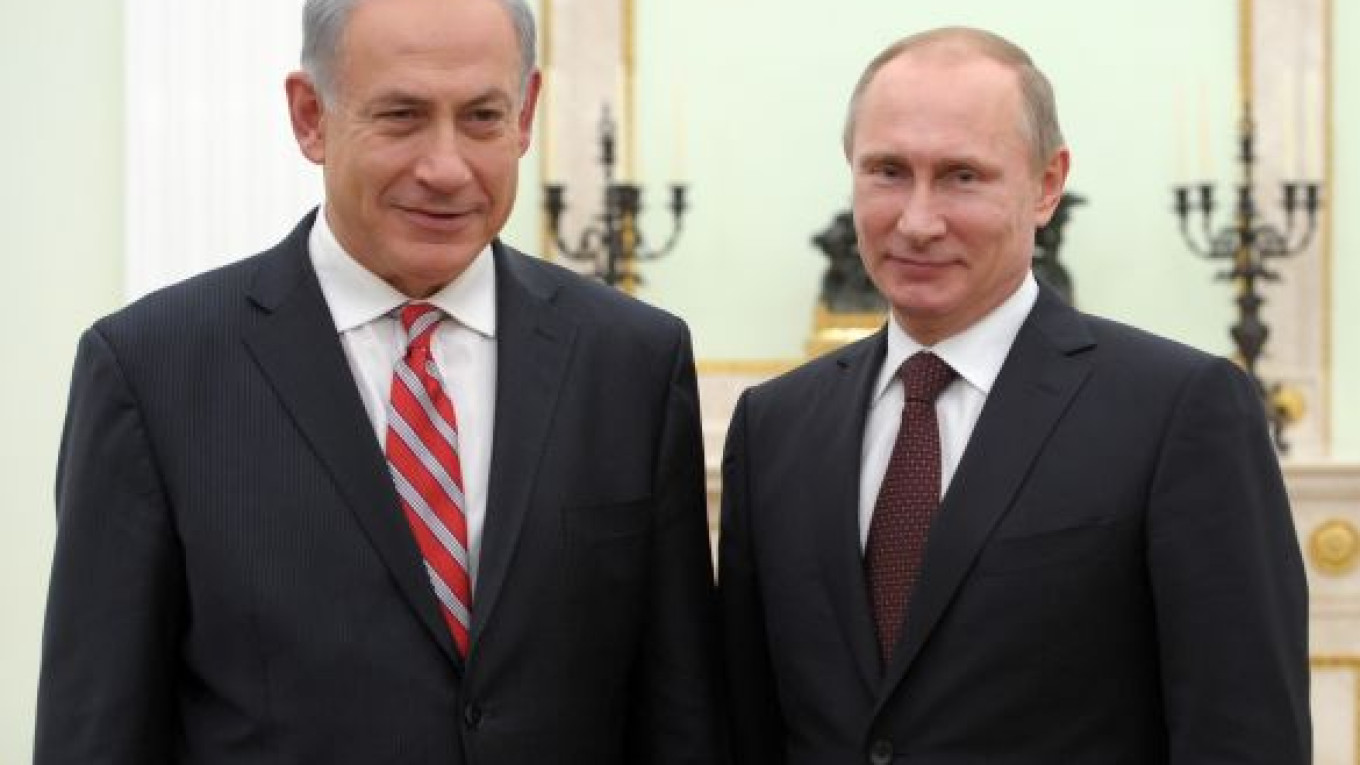President Vladimir Putin was set to meet with Israeli Prime Minister Benjamin Netanyahu in talks at the Kremlin on Wednesday to discuss Israel's disapproval of a potential international nuclear agreement with Iran, as well as other regional security issues.
Netanyahu's visit to the Kremlin coincides with the third round of talks between Iran and the P5+1 — the five permanent members of the United Nations Security Council and Germany — which began yesterday in the hopes that the Iranian government would suspend its nuclear activities in exchange for a reduction of U.S., European Union and UN sanctions.
After Jerusalem found itself at odds with Washington on the prospect of a nuclear agreement with Iran, Netanyahu decided to take his concerns to Putin in a bid to secure tougher terms. Under the current deal, Jerusalem believes easing sanctions on Iran will do nothing to prevent it from continuing its uranium enrichment or make it halt its development of a heavy water reactor.
But Netanyahu may find Putin to be a hard sell, as Russia — which built Iran's Bushehr nuclear power plant and still has its own specialists on site for technical support — has generally been less suspicious of Iran's nuclear ambitions.
Yevgeny Satanovsky, president of the Moscow-based Institute of the Middle East, said the chances of Putin being moved by Netanyahu's outreach were slim.
"It is 100 percent certain that Putin will listen to Netanyahu and even tell him he agrees with him," said Yevgeny Satanovsky, the president of the Moscow-based Institute of the Middle East. "But it is too late. Negotiations with Iran will continue."
Lending credence to that notion, Putin stressed in a phone call with Iranian President Hassan Rouhani on Nov. 18 that there was a "real chance to find a solution" to the Iranian nuclear issue, according to a transcript on the Kremlin's website.
Israel's deputy foreign minister, Zeev Elkin, said ahead of the trip that his country did not expect a radical change in Moscow's stance.
"Russia is not about to espouse the Israeli position," he told public radio before departing with Netanyahu. "But any small budge could influence the whole process."
Despite Russia's sympathy for Israel — where there are more than 1 million Russian-speakers — a potential nuclear agreement with Iran remains "an Israeli problem," Satanovsky said.
Instead, the visit may demonstrate Russia's attempt to capitalize on the U.S.' disengagement with the Middle East, a move that analysts say is more for show than anything else.
Last week, Russian Foreign Minister Sergei Lavrov and Defense Minister Sergei Shoigu were in Cairo to discuss the expansion of Russo-Egyptian defense cooperation, one month after Washington suspended its $1.3 billion military aid to the country.
But according to Satanovsky, "Russia has no real interest in the Middle East."
"Russian trade with the Arab world is a quarter of what it is with Finland. But in the end, it is better that profit goes into your pocket rather than into your friend's," he said.
Putin last met Netanyahu for emergency talks in Sochi in May to discuss the situation in Syria. At that time, the Israeli Prime Minister urged Putin to cancel the delivery of Russia's S-300 surface-to-air systems to Syria and expressed dismay at Russia's shipment of Yakhont anti-ship missiles to Israel's troubled neighbor.
Moscow refused to back down and said it would honor its contracts to supply Syria, a long-time arms customer.
Contact the author at g.tetraultfarber@imedia.ru
A Message from The Moscow Times:
Dear readers,
We are facing unprecedented challenges. Russia's Prosecutor General's Office has designated The Moscow Times as an "undesirable" organization, criminalizing our work and putting our staff at risk of prosecution. This follows our earlier unjust labeling as a "foreign agent."
These actions are direct attempts to silence independent journalism in Russia. The authorities claim our work "discredits the decisions of the Russian leadership." We see things differently: we strive to provide accurate, unbiased reporting on Russia.
We, the journalists of The Moscow Times, refuse to be silenced. But to continue our work, we need your help.
Your support, no matter how small, makes a world of difference. If you can, please support us monthly starting from just $2. It's quick to set up, and every contribution makes a significant impact.
By supporting The Moscow Times, you're defending open, independent journalism in the face of repression. Thank you for standing with us.
Remind me later.


